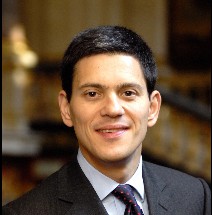Global displacement challenge reaches ‘epic’ proportions
The challenge of global displacement and the gutting international humanitarian support has reached “epic” proportions according to the head of a leading humanitarian agency.
David Miliband, President and CEO of the International Rescue Committee (IRC), said the global refugee population has hit historic highs, driven by war in Ukraine, violence in Sudan, state collapse in Venezuela, Taliban rule in Afghanistan, and a worsening humanitarian disaster in Gaza.
Speaking to the GZERO World news platform, Mr Milliband said that in 20 countries in crisis, there are more than 275 million people in humanitarian need, where people that depend on international aid and organisations like the IRC and the UN to survive.
Mr Miliband said there have been some recent positive developments – hundreds of thousands of refugees returning to Syria after the fall of the Assad regime, the potential for progress in the Eastern DRC, new technologies improving aid delivery.
“But the world is facing a humanitarian crisis of historic proportions and unless the international community steps up, tens of millions will suffer,” he said.
His comments come in wake of the Trump administration’s dismantling of USAID, which provided a third of global humanitarian funding, effectively leaving the world’s poorest countries to solve the planet’s biggest problem.
Humanitarian agencies say the move could result in hundreds of thousands of deaths.
“We face a new abnormal. Ten years ago, there were 50 to 60 million internally displaced people and refugees. Now, there’s 120 million,” said Mr Miliband, who is also a former British Foreign Secretary.
“The scale of impunity, the loss of international engagement is epic. 
“We face a new abnormal. 10 years ago, there were 50 to 60 million internally displaced people and refugees. Now, there’s 123 million,” Miliband says, “The scale of impunity, the loss of international engagement is epic.
“The tragedy of all ongoing wars is that both sides think they can still win. That’s the story of Sudan, it’s the story of Ukraine and those places are not sustainable. That’s why people are leaving the and that’s why people are dying there,” he said.
Mr Miliband the world is seeing more unsustainable and failed states.
“We are looking at the symptoms of a ground zero world, a leaderless world, a world without rules, a world without guardrails. In 20 countries in crisis there are now 275 million people in need of humanitarian aid,” he said.
“This is not a sustainable situation, not even if the aid system was working with full disbursement of money at 0.7 per cent of GNP, which is the UN’s target, and it was being delivered in the most effective way – neither of which are happening at the moment.
“The aid budget has been shrunk, led by the US obviously. And there is the huge challenge of the aid budget being spread too thin – from the acute emergencies through to preparedness for the next COVID event.
“What we face is fragile states becoming failing states, failing states becoming so failed that the export their own problems because none of these situations remain confined in the countries where they start,” Mr Miliband said.
He said regional nations and the international community are not doing enough to stop wars.
“The scale of the abrogation of the international system is very high. The UN is blocked from doing its work and there are all sorts of attempts to block what NGOs are doing,” Mr Miliband said.
“So, you have essentially the implosion of a country under the duress of, on the one hand, the sponsorship of war and, on the other, the retreat of diplomacy.”
He said the shuttering of US AID has affected the work of humanitarian agencies around the world.
“The US was the anchor of the global aid system. It calmed troubled waters through the scale of what the US did and the breadth of what it did – everything from preparedness for famines to emergency relief after earthquakes and everything in between.”
Mr Miliband said his own organisation had lost $US140 million in funding and it had to close programs affecting two million people.
“It’s a very big shock to the system. Our plea to the administration is not to pull the rug from under vital services. The anchor being pulled up is costing lives.”
He said China sees enormous opportunity in the de-Americanisation of the global system but would not move into the humanitarian sector.
“They have struck a deal with UNICEF in Cambodia, but they are not on the humanitarian track. The have a very strong economic development drive instead,” Mr Miliband said.
“The sucking sound you can hear is money leaving the humanitarian sector but its not being replaced,” he said.
“At the moment, the poorest people in the world are suffering a double whammy. One, is the reduction in aid flows, and secondly, global, interest rates are higher than they were a couple of years ago, so health and education budgets in poor countries are being raided to pay off debts; and that means there is less to go round domestically.”
Mr Miliband said a global soft power competition was beginning.
“The biggest player is going to be the European Union because it is now the largest aid donor in the world and the great thing about EU budgets is that they are seven-year budgets. This means you have some certainty.
“The big issue is where does the money go; does it go to the fragile and conflict states and does it have the political shoulder weight behind to open up aid flows to places like Sudan and Gaza where people are in desperate need,” Mr Miliband said.
See the full interview: The global refugee crisis is at breaking point – GZERO Media












